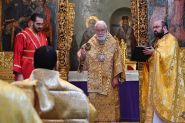
Caretaker Prime Minister Najib Mikati has firmly defended the position of the Presidency of the Council of Ministers, saying, "I do not accept that this position be attacked in any way whatsoever.”
His comments came during a meeting with the Metropolitan of Beirut, Bishop Elias Audi, whom he visited on Thursday.
Regarding the appointments to be made by the Council of Ministers to fill vacancies in the military institution, Mikati insisted that "there are aspects linked to the powers of the Prime Minister and his position.”
Mikati’s remarks came in the wake of criticism leveled against him after he had called a Cabinet meeting on Friday December 15, at the same time as a parliamentary session dedicated to the same issue, namely that of extending the term of office of the Army's Commander-in-Chief, General Joseph Aoun.
Zgharta MP Michel Moawad described the "timing" of the Cabinet session as "suspicious," while Samir Geagea, leader of the Lebanese Forces (LF), expressed "doubt as to the intentions" of the head of government, also questioning "the timing of the meeting he has called.”
Mikati said, "I'd like to refrain from any media polemics on this subject, because in all things you have to consider the end, and so far, the results have been positive.” He was alluding to the Cabinet's approval on Tuesday December 19 of the law extending Aoun's term of office, which was passed by Parliament.
Social and economic issues were also discussed, "All of which are of concern to Archbishop Audi,” Mikati added. In response to a question about wages and salaries for the public sector and retired military personnel, he explained that the government "is limited in this area by a set ceiling to ensure the stability of the exchange rate," a ceiling that cannot be exceeded.
These salaries are drawn "from the entire budget" of the State, but "the budget has shrunk and salaries have therefore decreased,” he said.
In conclusion, Mikati hoped that "economic growth in the years to come" would lead to an "increase in the budget" and "allow for a readjustment of salaries.”
His comments came during a meeting with the Metropolitan of Beirut, Bishop Elias Audi, whom he visited on Thursday.
Regarding the appointments to be made by the Council of Ministers to fill vacancies in the military institution, Mikati insisted that "there are aspects linked to the powers of the Prime Minister and his position.”
Mikati’s remarks came in the wake of criticism leveled against him after he had called a Cabinet meeting on Friday December 15, at the same time as a parliamentary session dedicated to the same issue, namely that of extending the term of office of the Army's Commander-in-Chief, General Joseph Aoun.
Zgharta MP Michel Moawad described the "timing" of the Cabinet session as "suspicious," while Samir Geagea, leader of the Lebanese Forces (LF), expressed "doubt as to the intentions" of the head of government, also questioning "the timing of the meeting he has called.”
Mikati said, "I'd like to refrain from any media polemics on this subject, because in all things you have to consider the end, and so far, the results have been positive.” He was alluding to the Cabinet's approval on Tuesday December 19 of the law extending Aoun's term of office, which was passed by Parliament.
Social and economic issues were also discussed, "All of which are of concern to Archbishop Audi,” Mikati added. In response to a question about wages and salaries for the public sector and retired military personnel, he explained that the government "is limited in this area by a set ceiling to ensure the stability of the exchange rate," a ceiling that cannot be exceeded.
These salaries are drawn "from the entire budget" of the State, but "the budget has shrunk and salaries have therefore decreased,” he said.
In conclusion, Mikati hoped that "economic growth in the years to come" would lead to an "increase in the budget" and "allow for a readjustment of salaries.”
Read more



Comments